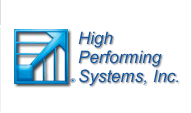by Grenae Thompson
Since research on Emotional Intelligence began, results overwhelmingly show that with all other things being equal people high in Emotional Intelligence (EI) outperform people who have low EI. It doesn't make sense to ignore this kind of data. Companies looking for a competitive edge are making the decision to implement EI at some level.
A first step might be to send a trainer(s) to get certified on an EI assessment or hire a qualified person to provide EI feedback to your employees. Next, HR/OD presents EI training that is well attended, but initial positive results produce little if any significant change. Since research indicates that high EI scores equal job success, you want to use EI to select the "right" people for jobs. It seems, however, that just scoring high on EI is not enough.
Unfortunately, many efforts to implement EI have stalled just short of seeing the anticipated results. Why is it difficult to make EI programs work? Let's look at how one HPS client solved this problem.
EnergyCorp* realized they needed help to implement their EI program. Assessing leaders and giving them feedback turned out to be the easy part. Creating an implementation plan, getting buy-in from senior management, developing EI success profiles by job, and creating training specific to each level and department proved to be more complicated.
They decided to hire outside help to create a specific implementation plan for EnergyCorp and HPS got the call. In the long run this saved them time and money and produced a process that worked for their company.
Here are some of the key steps mentioned above that must be part of a successful EI implementation plan like the one HPS helped EnergyCorp create.
- Get leadership support for the program. Build a case to show the value of recognizing and managing emotions. Link lost revenue to a specific area where productivity has been down due to emotion-based interpersonal problems. This is easier to do than you might think. A champion on the senior management team will get—and keep—support from other senior managers. He or she will keep the program alive by getting the necessary resources and staying apprised of successes.
- Expand your resources. Emotional Intelligence is still in its infancy as a business concept. Unless you have been researching and using EI for the past 20 years, it might make more sense to hire an experienced EI practitioner for implementation. Continue to build a resource 'library' that includes a variety of different media such as mobile-friendly audios, videos, books and articles to download. Encourage people to invest in their own self improvement and to share what they are learning.
- Provide coaching. Ongoing coaching for members of your EI implementation team and at-risk leaders and employees will produce immediate results. Experienced EI coaches can help you fill gaps in knowledge and application in just a few sessions. If you have a limited budget, this will provide the most immediate return on your investment.
- Develop statistically sound job success profiles. HPS president Dick Thompson, Ph.D., has said that, "Emotional Intelligence is situationally specific. By this I mean that overall EI is a good general predictor of success. But the more powerful predictor is the specific combination of EI components for a specific type of job. This is what determines success." This process involves analyzing data from job descriptions, performance measures, and EI assessment to determine which areas of EI will predict success. Different scales on an EI assessment have different levels of importance in different jobs. You can get more information about this process here.
- Provide experiential EI training. Learning about EI requires experiential training. People should be able to recognize and manage their own and others' emotions in different situations. To do this successfully, they must experience emotions. We need to educate ourselves about emotions before we can learn how to manage them. This is the part of implementation that is bypassed most often.
As a result of getting help to create their implementation plan, including training and EI job profiles, EnergyCorp was able to move quickly and efficiently toward getting results with EI. Within two quarters, sales effectiveness showed a significant increase. EI Job Success Profiles helped with talent selection, and new hires became productive faster than ever before.
Emotional Intelligence is important because it has caused us to think more intelligently about emotions, to acknowledge the role they play in leadership, decision making, success and so many other aspects of our work. If you are thinking about or have already begun to implement EI, avoid the "failure at the brink of success syndrome" by taking the necessary steps outlined above.
*EnergyCorp is the fictitious name of an actual HPS client.
____________________________________
Grenae Thompson, VP of HPS, writes content that connects people with ideas and resources to help them work better together. You are invited to connect with Grenae Thompson on LinkedIn or @DGGT on Twitter
HPS is an award-winning world leader in EQ-i 2.0® certification, EI training and implementation, and success profiles. Call 706-769-5836 to talk more about your organization's specific needs.
Dr. Henry L. (Dick) Thompson, president & CEO of HPS, is a popular speaker and conference presenter on the topics of Emotional Intelligence, leadership, decision making in high stress environments, and stress resilience. He is available on a limited basis to speak to groups. Call 706-769-5836 to schedule either an on-site or virtual presentation.
For additional information on Emotional Intelligence visit here. For additional information on the EQ-i 2.0 give us a call (706-769-5836) or visit here. |
